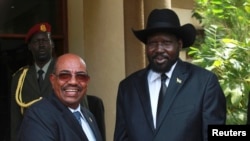JUBA, SOUTH SUDAN —
Sudanese President Omar al Bashir paid a historic first visit to South Sudan Friday, fueling hopes of peace and cooperation between the two countries, after a tense year that has brought them to the brink of war over oil rights and territorial claims.
During the one-day visit, the Sudanese president met with his South Sudanese counterpart Salva Kiir for talks focussed on the implementation of agreements the two countries signed last year, but only recently began to implement.
Kiir described the discussions as cordial, and said that the two leaders pledged to improve security along the border and allow free trade.
They also discussed how to share revenues from oil, officials said. The issue has brought the two neighbors to blows in the past and led to South Sudan, which controls most of the oil in the Sudans, halting production in January last year amid a row with Khartoum over pipeline fees.
The differences were resolved last month when an agreement was signed in Ethiopia. Production resumed days before Bashir's visit.
Although they failed to reach a definitive agreement on the disputed oil-rich region of Abyei, they agreed to continue negotiations on the key border area.
Bashir said his visit signaled his commitment to peace between the two countries, which once formed the largest country in Africa. After a long civil war ended in 2005, South Sudan voted in a referendum in 2011 to split from Sudan and become an independent nation. Bashir had not set foot in the world's newest nation until Friday.
The Sudanese leader was greeted at Juba airport with a guard of honor and red carpet before he and Kiir made their way to the presidential office for talks.
In the South Sudanese capital, the visit was met with mixed reactions.
James Mabor Gatkuoth, the leader of the opposition National Democratic Front Party, said the visit was an opportunity for the two countries to normalize relations and reach firm agreements on critical issues, like the contested Abyei region.
But, he added, not all South Sudanese shared his positive take on the visit of Bashir, who is wanted by the international war crimes court in The Hague for allegedly orchestrating atrocities in Darfur.
“There are mixed feelings," Gatkuoth said.
"Some people feel that, as he’s wanted in the Hague... he doesn’t deserve to be received. But a majority think the peace agreement was made by him, and they’re right to think so.”
Biel Boutros Biel, the executive director of the South Sudan Human Rights Society for Advocacy, dismissed Bashir’s visit as a political move and said he did not expect the visit would improve relations.
"We don’t see a reason why people should celebrate Bashir’s visit as a solution to everything. Once he goes back to Khartoum, he’s the same Bashir.
"People are still dying... and nobody’s talking about it. They’re just talking that Bashir is coming,” he said.
During the one-day visit, the Sudanese president met with his South Sudanese counterpart Salva Kiir for talks focussed on the implementation of agreements the two countries signed last year, but only recently began to implement.
Kiir described the discussions as cordial, and said that the two leaders pledged to improve security along the border and allow free trade.
They also discussed how to share revenues from oil, officials said. The issue has brought the two neighbors to blows in the past and led to South Sudan, which controls most of the oil in the Sudans, halting production in January last year amid a row with Khartoum over pipeline fees.
The differences were resolved last month when an agreement was signed in Ethiopia. Production resumed days before Bashir's visit.
Although they failed to reach a definitive agreement on the disputed oil-rich region of Abyei, they agreed to continue negotiations on the key border area.
Bashir said his visit signaled his commitment to peace between the two countries, which once formed the largest country in Africa. After a long civil war ended in 2005, South Sudan voted in a referendum in 2011 to split from Sudan and become an independent nation. Bashir had not set foot in the world's newest nation until Friday.
The Sudanese leader was greeted at Juba airport with a guard of honor and red carpet before he and Kiir made their way to the presidential office for talks.
In the South Sudanese capital, the visit was met with mixed reactions.
James Mabor Gatkuoth, the leader of the opposition National Democratic Front Party, said the visit was an opportunity for the two countries to normalize relations and reach firm agreements on critical issues, like the contested Abyei region.
But, he added, not all South Sudanese shared his positive take on the visit of Bashir, who is wanted by the international war crimes court in The Hague for allegedly orchestrating atrocities in Darfur.
“There are mixed feelings," Gatkuoth said.
"Some people feel that, as he’s wanted in the Hague... he doesn’t deserve to be received. But a majority think the peace agreement was made by him, and they’re right to think so.”
Biel Boutros Biel, the executive director of the South Sudan Human Rights Society for Advocacy, dismissed Bashir’s visit as a political move and said he did not expect the visit would improve relations.
"We don’t see a reason why people should celebrate Bashir’s visit as a solution to everything. Once he goes back to Khartoum, he’s the same Bashir.
"People are still dying... and nobody’s talking about it. They’re just talking that Bashir is coming,” he said.
